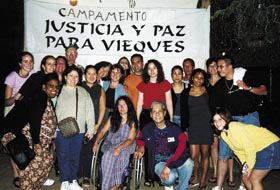|
This is an archived article.
For the latest news, go to the Advance
Homepage
For more archives, go to the Advance Archive/Search Page. |
||
|
Puerto
Rico Exchange Offers Insight
into Island, Immigrant Communities By Sherry Fisher
On a hot day in mid-summer, after a visit to Windham Hospital and a slide show about the local community, the group from the University of Puerto Rico enjoyed a bus tour of the county. Earlier in the week, they explored communities in Bridgeport, New Haven, and Hartford.
From July 15 through July 24, 11 students and two faculty from the University of Puerto Rico spent two weeks in Connecticut, visiting social work agencies that serve Puerto Ricans and other Latinos. They also participated in lectures and panel discussions offered at the University and elsewhere. Many of the local professionals who presented talks and invited the exchange students to their agencies were graduates of the UConn School of Social Work. The program, now in its second year, was developed to give social work students at both UConn and the University of Puerto Rico a better understanding of the social service needs of the Puerto Rican population. The first group of UConn students traveled to Puerto Rico in January 2001. Another group of 20 students from the University will travel to San Juan and Vieques in January 2003. The UConn students who travel to Puerto Rico are offered an opportunity to learn about indigenous Puerto Rican culture and to understand the values on which it is based, said Julio Morales, a professor of social work at UConn who initiated the program. This gives them a better appreciation of the strengths of Puerto Rican families and communities, he said. Morales said students learn about the most common problems and needs of Puerto Rican people living on the island, which, in turn, helps them assess Puerto Rican migration to the U.S. They also are exposed to the concerns that migrants have about friends and relatives in Puerto Rico who do not migrate. "The program is crucial because so many people from Puerto Rico migrate to the U.S. and vice versa," Morales said. Puerto Ricans are the largest ethnic group in Hartford, and many of the graduates of the UConn program work there or in other Connecticut cities with large Puerto Rican populations. Karen Rivera, a graduate of UConn's social work program who will start a job as a social worker at Natchaug Elementary School in Willimantic this fall, was among the group that visited Puerto Rico and Vieques last year. "I was surprised with what they were able to do with limited resources," she said. "They were very creative. They brainstormed and thought of ways to provide services and find resources incorporating the community." The exchange was also an eye-opener for students from Puerto Rico visiting the United States. Lirio Negroni-Rodriguez, an assistant professor of Puerto Rican/Latino studies in the School of Social Work who collaborated with Morales on the content of the exchange program, said the UConn students who visited Puerto Rico but didn't speak Spanish became more aware of the difficulties Puerto Rican people face when they come to the U.S. "Having to depend on translators made these students more sensitive to those people in the U.S. who don't speak English," she said. Esterla Barreto, an assistant professor of social work at the University of Puerto Rico, said the exchange program allows students from Puerto Rico to "see an extension of what we are as a community. There are 4 million Puerto Ricans on the island and 3.5 million in the U.S.," she said. "It tells the story of half of our population." Kay Davidson, dean of the School of Social Work, said the visit gave students from Puerto Rico insights into the experience of immigrants to the United States. "They got a sense of what a struggle it is for a Latino who settles in this country - whether a Puerto Rican or someone from a foreign country - to both become part of the local culture and retain a sense of their own culture and identity." The exchange students from Puerto Rico said they gained new perspectives on life for Latinos in the United States. "I'm impressed that Latinos from different countries get together here, even though we in Latin America have different customs and some different languages," said Jenny Mirabal, a student from Puerto Rico. "Here, they're going through the same kinds of difficulties." Janella Plana-Garcia said she liked seeing people from different backgrounds working together to solve problems. "People are starting to see that racism and differences are in the mind. Working together, they can analyze problems from different perspectives," she said. Morales said he hopes the exchange will be a model for other programs at the University. "I would like to see other units of the University duplicate this in the training of teachers, doctors, and dentists," he said. He also would like to establish exchange programs for social work faculty, as well as research collaboration between UConn and the University of Puerto Rico. As the bus carrying the students passed by a Victorian home in Willimantic, something on the front porch caught Jerika Garcia's eye. "It's a flag from Puerto Rico," she said. "That makes me feel proud." |
 he students are tourists of sorts, but with an academic
twist. They are part of an exchange program between the University
of Puerto Rico Graduate School of Social Work and the School of
Social Work at UConn.
he students are tourists of sorts, but with an academic
twist. They are part of an exchange program between the University
of Puerto Rico Graduate School of Social Work and the School of
Social Work at UConn.
